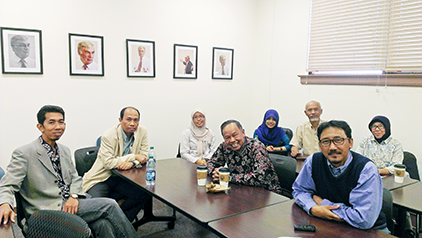By Lisa Y. Garibay
UTEP News Service
UTEP recently received its largest group of Indonesian visitors as part of a unique cooperative effort connecting communication, education and environmentalism.

During their two-week visit to El Paso, the eight-member team of faculty and students from the University of Mulawarman spoke with more than 150 students in a variety of classes and conducted community presentations at the El Paso Zoo.
The Indonesian team and their American counterparts are exploring conservation with approaches using simple technology that can be implemented within impoverished locales to further environmental preservation or more efficient use of water.
“We have the same situations with our local communities,” explained Mustafa Agung Sardjono, Ph.D. “There are many poor people who aren’t getting what they need from their environment or are not conserving resources like water in the best ways.”
The visit was part of a project titled “Enhancing Behavior Change through Conservation Programs,” which partners UTEP with the Indonesian university and conservation organization Rare. (A previous UTEP News story explains more about the project, which was funded by a $997,313 grant from the U.S. Agency for International Development.)
Agung Sardjono, one of the grant’s principal investigators, was excited to have this opportunity to tell UTEP students how much their region has in common with Indonesia and how much they have to share about environmental conservation and empowerment of local communities, including scenarios not necessarily related to conservation.
In addition, Agung Sardjono hopes by learning more about how UTEP cultivates its students and faculty, his own academic institution can improve. Some of the non-academic activities the group saw — including basketball games, bookstore cafes and UTEP student organizations — gave them hints on how a university can benefit students and faculty by being more holistic.
Agung Sardjono illustrated some of the differences between his university and UTEP: their campus is much smaller; they have limited opportunities for younger scholars to advance in the academy; and they use technology less often and with fewer variations.
Many of the approximately 600 undergraduates come to Mulawarman’s forestry program from regions all over Indonesia immediately after high school. Their graduate students return to school after working in a professional field and seek a postgraduate degree in order to advance their careers.
Triyono Sudarmaji, Ph.D., said that the collective dream for the University of Mulawarman is to grow into one of the best forestry research institutions in the world, especially given its location in the heart of the tropical rainforest. The Indonesian team has been inspired by UTEP’s success in leveraging its unique location and population.
While one might assume a project rooted in ecology would come to UTEP through the College of Science, the program is through UTEP’s Department of Communication in the College of Liberal Arts. Without effective communication, there can be endless innovations in environmental conservation and quality of life, but things will not change.
“We already have good policies, but we don’t know how to communicate them to the lower governments and local communities,” Agung Sardjono said, stressing that expertise in this regard is all the more necessary given that communication between men and women is still difficult in his culture. “It is important to us not only to use power, but also to use the heart in order to understand the situations faced by the local communities and local governments.”
Project Director and UTEP Department of Communication Chair Stacey Sowards, Ph.D., is most excited to be bringing knowledge from Indonesia not just to UTEP but to the United States as a whole. Despite it being the fourth largest country in the world and having a span close to that of the U.S., very few research studies are done in Indonesia by American institutions.
“There are a lot of pressing environmental issues related to forestry, food security and marine ecosystems, plus so many different conservation, political and cultural issues that are not understood well by Americans,” Sowards said.
Sowards was thrilled about having her Indonesian colleagues at UTEP to give its binational and bicultural student body the chance to further broaden its horizons through cooperation with even more nations and cultures.
“There are other kinds of border issues that we can experience in the world,” she said.
Sowards added that many times her students want to know what they can do to help conservation efforts and protest development that is not environmentally conscious.
“There are no easy solutions to the kinds of problems that we’re talking about,” she explained. “It takes much greater, in-depth exploration of these really complicated issues. You can’t just say, ‘Do this and you’re done.’”
Agung Sardjono agreed it is critical to have a constant exchange of information between academics, community organizations and the public.
“Many people who are not in the field may believe that boycott is the best situation when it comes to conservation, but that may not be true,” he said, referring to current debates over the environmental and economic impact of palm oil, which is in high demand globally. “Many local communities may depend on a product like palm oil and a boycott will hurt them.”
UTEP is taking one last group of faculty and students to Indonesia this summer before their grant from the U.S. Agency for International Development ends. The grant has permitted more than 50 students and eight faculty members from UTEP to visit the archipelago.
“Although physically a world apart, El Paso and Samarinda have a lot in common when it comes to natural resources management and conservation, and environmental protection,” said the project’s co-director, William Hargrove, Ph.D., referring to the capital of the Indonesian province of East Kalimantan where University of Mulawarman is located.
“The collaboration between Mulawarman and UTEP has enabled us each to explore new ways of thinking about environmental protection and conservation,” he continued. “Our partnership has vastly expanded learning opportunities for our students and theirs.”